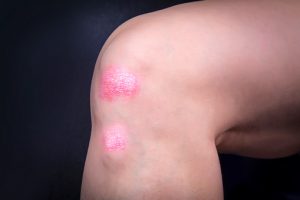 Psoriasis patients have fewer opportunities for biologics treatment as they age. The findings suggest that age is a large factor when it comes to treatment options for psoriasis – a skin condition. The researchers found that an age increase of 30 years reduced access to treatment through biologics by 65 percent.
Psoriasis patients have fewer opportunities for biologics treatment as they age. The findings suggest that age is a large factor when it comes to treatment options for psoriasis – a skin condition. The researchers found that an age increase of 30 years reduced access to treatment through biologics by 65 percent.
The study was led by Marcus Schmitt-Egenolf at Umeå University who explored an aging cohort with regards to access to pharmaceuticals for psoriasis. The study found that seniors do not have as much access to a new form of treatment – known as biologics – compared to their younger counterparts.
Advertisement
Biologics is a form of medicine that targets T cells or blocks immune system proteins. Although it is a more effective mode of treatment, it is often more expensive than traditional treatment options.
Marcus Schmitt-Egenolf said, “This result indicates that there are huge differences in access of treatments with biologics between patients who seem the same in all other aspects apart from age. The differences are becoming increasingly clear if you compare a mother to her daughter and suppose that there is a 30-year age difference. The chances for the mother to start a treatment with biologics are then a third in comparison to the daughter and the only reason for this is her age.”
The results show that improvements need to be made in order to boost equality when it comes to treatment methods.
The researchers looked at data from 1,465 psoriasis patients and measured the effects of aging on the access of biologics. Factors like gender, BMI, comorbidity (having illnesses other than psoriasis), severity of psoriasis, and the educational level of the patient were all taken into account.
Psoriasis is commonly treated with topical creams, but many patients seek out relief for their condition through biologics.
Psoriasis treatment options
Treatment options for psoriasis are dependent on the condition’s severity and which part of the skin is affected. Your doctor may get you started with a milder treatment in the beginning and then increase the intensity, if it’s unsuccessful.
Although there are many treatment options available for psoriasis, not all of them are effective, so it can be quite difficult finding the most effective one for you. Some treatment options for psoriasis include:
- Topical – creams, ointments
- Phototherapy – skin is exposed to certain ultraviolet lights
- Systemic – oral and injected medications that target the entire body
Psoriasis treatment may require a regular review to determine its effectiveness and to see if any changes are needed.
Related Reading:
Psoriasis and eczema skin disease: differences, causes, symptoms, and treatment
If you have ever experienced itchy, irritated skin, then you know how frustrating and uncomfortable it can be, so understanding the differences between skin diseases like psoriasis and eczema, and knowing how to go about treating the skin, can bring both physical and emotional comfort. Continue reading…
Advertisement
Psoriasis skin disorder inflames arteries, increases heart disease risk
New research suggests psoriasis, a skin disorder, leads to artery inflammation and increases heart disease risk. Senior investigator Dr. Nehal Mehta said, “As the amount of psoriasis increases, the amount of blood vessel inflammation increases.” The team also uncovered that psoriasis may add to the risk of stroke and heart attack, even mild cases. Continue reading…
Sources:
http://www.medfak.umu.se/english/about-the-faculty/news/newsdetailpage/psoriasis-patients-have-reduced-access-to-efficient-treatment-method-with-age.cid261654
http://www.nhs.uk/conditions/Psoriasis/Pages/Treatment.aspx
http://onlinelibrary.wiley.com/doi/10.1111/bjd.14331/abstract;jsessionid=75CEBCEAA53E7F26391D7DED3C4F8C7A.f02t03
